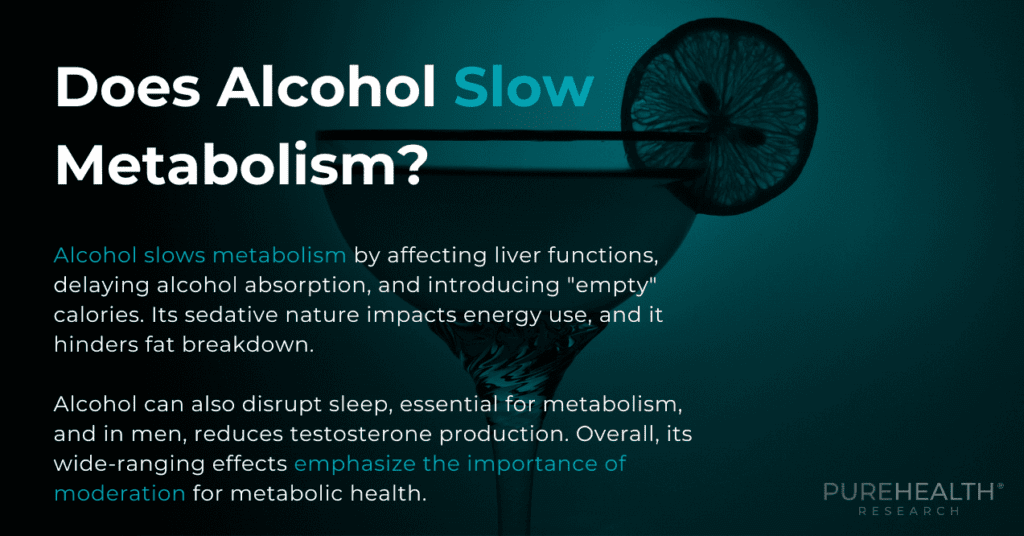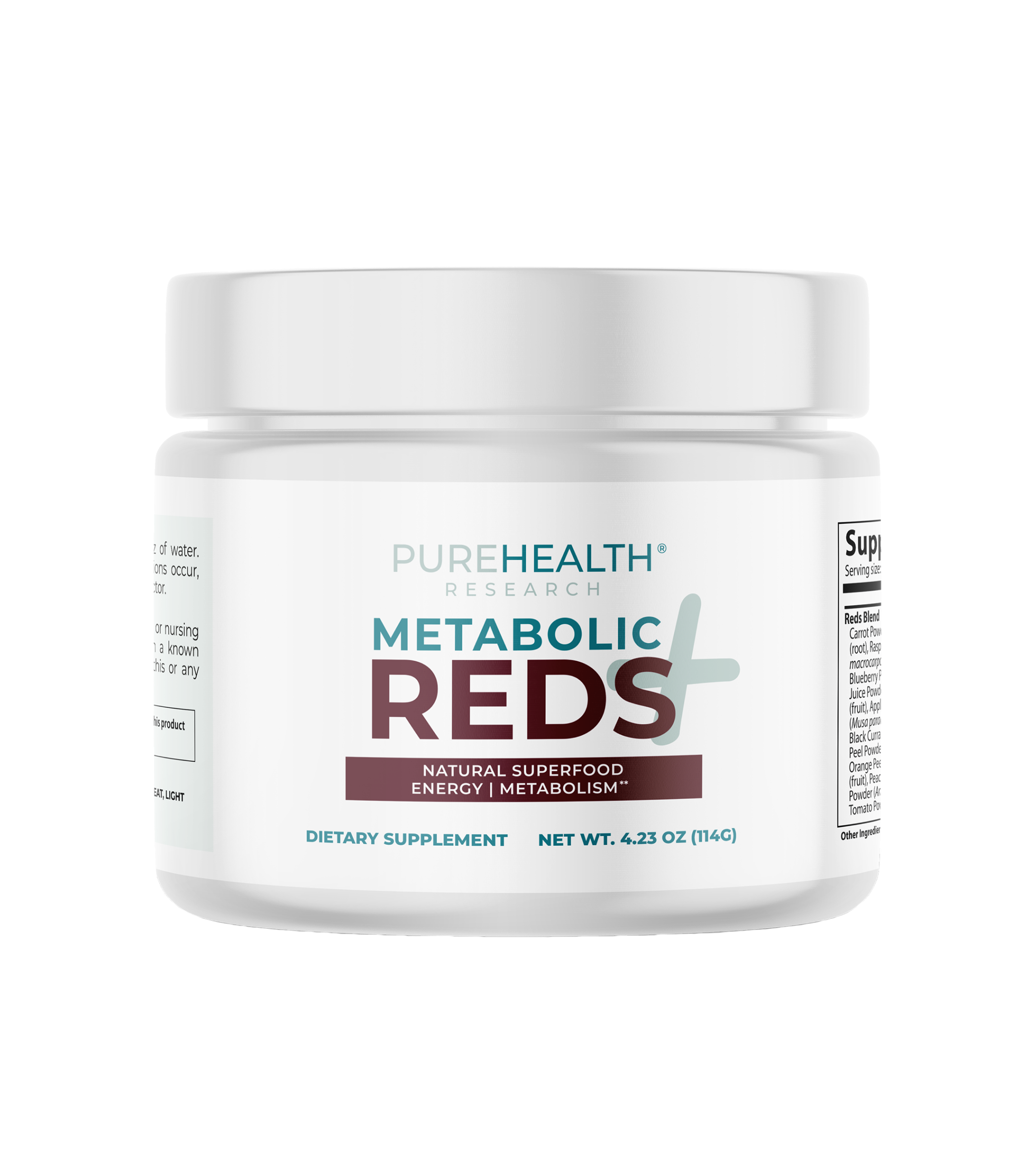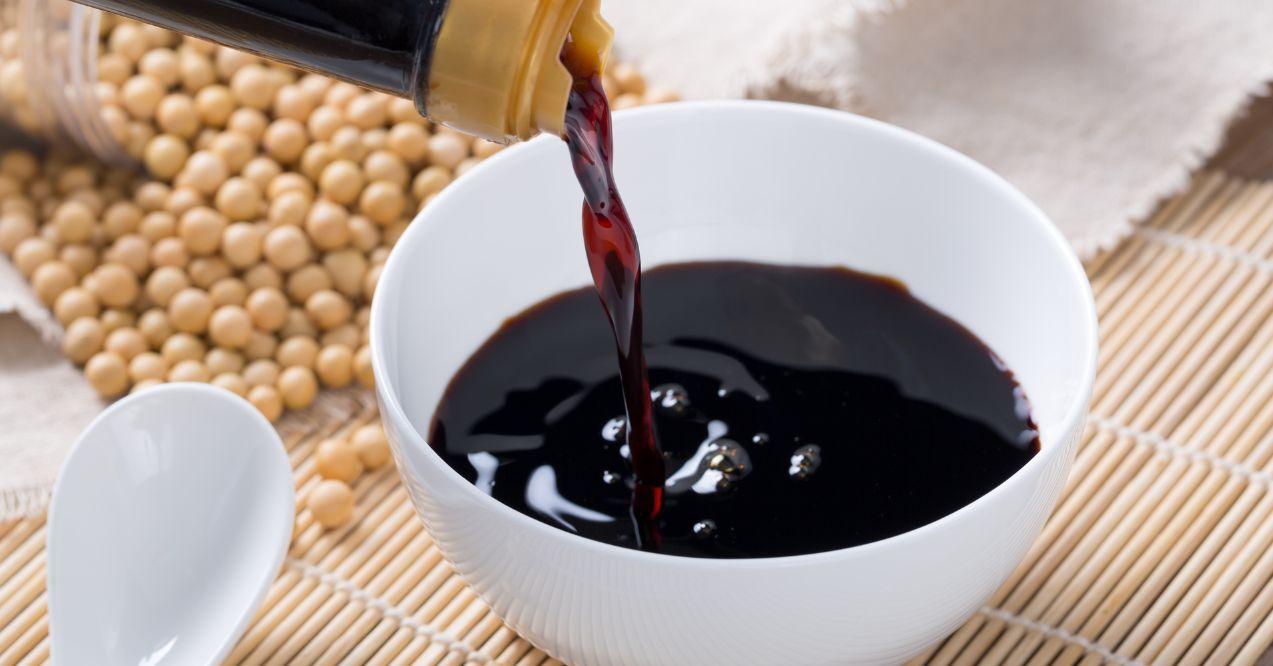Does Alcohol Slow Metabolism? Boozy Secret
Medically reviewed by our experts


Does alcohol slow metabolism? People often substitute food intake with considerable alcohol consumption by drinking beer. For people with alcohol dependence (AD), more than 10% of their total energy intake and over 50% of their dietary consumption is attributable to consuming alcohol. For these individuals, alcohol can easily enter and affect most tissues in their body during circulatory system absorption. Body composition is critical because as the proportion of fat increases in a person’s body, the resulting concentration of alcohol will be even higher within their overall lean tissue.
Moreover, any food content in an individual’s stomach delays alcohol absorption into the bloodstream, delaying the alcohol metabolizing process. Since alcohol has become part of some cultures and people’s busy lives, finding a proper balance can often seem exhausting.
Metabolism, which is the process the body uses to convert food into energy, is a crucial bodily function that alcohol consumption can alter dramatically. The frequency of consumption and the speed at which you burn off calories can also influence metabolic health. Understanding metabolism-related issues concerning this popular recreational beverage is vital for a healthy lifestyle.


Why Does Alcohol Slow Your Metabolism?
So, why does alcohol slow your metabolism exactly? Many usually point to erratic eating patterns. However, many people don’t know that alcohol can have an even more significant impact on their metabolism through its effect on the liver’s functions. Alcohol affects fat and cholesterol metabolism in the body, leading to changes in liver enzyme activity, which can slow down metabolic rate.
By slowing down fat metabolism, alcohol can make it harder for the body to access stored fats and burn them off as energy. The metabolic tolerance that results from ALDH (aldehyde dehydrogenase) and ADH (alcohol dehydrogenase) enzymes increases the body’s requirement for energy to metabolize the alcohol in a person’s system. Thus, how liver enzymes metabolize this substance affects how efficiently a person’s metabolism works.
How Long Does Alcohol Slow Your Metabolism?
The chemical breakdown of alcohol takes time and varies with the beverage type consumed. Generally, the body can take up to 24 hours to fully metabolize alcohol out of its system. When your liver cannot process this substance fast enough, it ends up in your bloodstream. The ALDH and ADH enzymes, which break down alcohol in the body, slow down as age increases, causing the metabolism of this substance to occur slower in older individuals than in youthful ones.
Studies reveal that women metabolize alcohol more quickly than men since they generally have higher fat levels and less muscle mass to absorb the alcohol. The hormonal differences between genders cause females to feel the effects of drinking more acutely and for longer durations. The amount and concentration are essential determinants as their conversion occurs at a particular rate. The body is unable to use or store alcohol, so the liver focuses on processing it before fats and carbs. So, going back to our question, how long does alcohol slow your metabolism? Depending on the individual’s genetics and lifestyle, it may take up to one ounce of liquor per hour.
How Does Alcohol Slow Metabolism?
The question “How does alcohol slow metabolism?” becomes clear once we recognize this substance interferes with the body’s ability to produce energy. It notably affects your body’s metabolism, leading to several issues. Let’s look at the following details on how alcohol slows metabolism.


Alcohol Impact on Physical Performance
Alcohol affects physical performance since the body perceives it as a sedative. As the body attempts to metabolize alcohol, it postpones all other digestive activities, and energy sources such as carbs will burn inefficiently and interrupt bodily function. This process hinders the absorption of essential vitamins and minerals and diminishes the amount of energy stored. Physical performance gets hampered due to the decrease of the metabolic rate. It can result in fatigue or a general lack of strength.
As one drinks, alcohol can become more assertive to the body and impact some physical capabilities, such as coordination. Since the body is instead using its energy resources to counter the alcohol inside, its own processes become slower and its performance weaker. Your concentration is not where it should be, leading to longer reaction times from the central nervous system, thus slowing your physical performance. Generally, alcohol consumption directly affects metabolism by slowing it down.
Drinking Adds Extra or Lower Quality Calories
Adding alcohol to one’s body is like adding extra calories to your daily calorie allowance; you cannot easily convert or store this energy. Some alcoholic beverages have high sugar content, so extra calories come from both the alcohol itself as well as additives like mixers or fruit juices. More calories mean the body will have to work harder to process them. The process obstructs metabolism as the added calories precede essential dietary nutrients.
Most alcoholic drinks also lack essential vitamins and minerals that make up a well-rounded diet, so they are considered empty calories. It means the body doesn’t gain any nutritious benefits from those drinks but still expends energy to break them down while slowing metabolism. An increase in excess calories can further affect metabolism, adding strain on the body’s energy resources. Thus, adding alcohol to a body puts unnecessary stress on its metabolic process, which can be damaging if done in excess or for prolonged periods.
Promotes Fatigue and Dehydration
Alcohol consumption leads to dehydration since it’s a diuretic. It stimulates the production of urine. When depleted, a person can often feel exhausted as their metabolism slows down and they lack the energy to perform any physical activity. Since the body is going through a diuretic process of pushing out toxins in urine while drinking, this process will result in improper metabolism.
The amount of water lost in urine while drinking is more than what you get from consuming alcoholic beverages, contributing to dehydration. For instance, one beer has 154 calories and about 14 grams of carbohydrates, meaning its energy content is significantly more than the same amount of water to compensate for any potential hydration loss. You will start feeling dehydrated faster as you consume alcohol, slowing your metabolism. Since dehydration hinders the body’s ability to function well, it can lead to fatigue. Therefore, if you still wonder how to clean system of alcohol, water is the answer. Not only does water eliminate alcohol, but it also ups your hydration level.
Slows Down Fat Metabolism
Alcohol interferes with enzymes, which help break down fat, resulting in a slower metabolic rate. When alcohol goes inside the bloodstream, it blocks the vital enzymes that break down body fats. The fat metabolism process slows down due to the alcohol’s disruption in the body.
Routinely drinking alcohol inhibits the body’s primary fat-burning enzymes. As soon as the body starts to metabolize alcohol, all other stomach processes come to a halt or operate inefficiently. Without access to the body’s stored fats for energy production, metabolism slows down, consequently affecting metabolic health. Moreover, the effects of alcohol on fat metabolism increase with more significant amounts, leading to greater fat storage over time.
Disturbs Sleep
The disturbance of sleep associated with alcohol also affects the metabolism cycle. Disrupted sleep causes hormonal imbalances, making concentrating and functioning at peak performance levels harder. The REM stage of sleep is critically vital for metabolic rejuvenation, and the lack of REM diminishes the energy your body can utilize. Getting restful and rejuvenating sleep is necessary for adequate metabolic functioning. However, alcohol can obstruct this process once it slips into the body’s hormone cycles.
Furthermore, alcohol disrupts periods of sleep, leading to more wakefulness, which can increase hunger and create an imbalance of hormones in energy metabolism. As a result, the person may feel unusually sleepy the following day due to the body’s inability to properly store energy and maintain regular metabolic rates. So, not getting enough restful sleep due to alcohol consumption will hurt the body’s metabolic rate, leading to sluggishness during daily activities.
Causes Weight Gain
The disruption of digestion from regular drinking can add to fat storage and weight gain since the food cannot be completely broken down or adequately utilized. Excessive drinking causes increased hunger as it affects the normal metabolism process, consuming an additional number of calories that are not necessary for energy expenditure.
If somebody asks you, “Does alcohol slow metabolism?” You can tell them that it has no dietary value, meaning it can only add to the calorie count. It can lower inhibitions and reduce self-control, leading to unhealthy food cravings. This situation can cause weight gain as the body cannot burn off those calories and store them instead. It makes it harder to feel full and satiated, increasing the total calorie intake in a person’s diet. This further disrupts normal metabolism, leading to ineffective fat burning, ultimately increasing weight gain and metabolic health problems.
Reduces Liver Function
The liver metabolizes alcohol and other toxins in the body by secreting enzymes into the bile, which helps digest food and dismantle fat cells. Excessive alcohol consumption can overload the liver with toxins, making it more difficult for the organ to function properly. It can lead to improper fat metabolism and further impair energy production in the general system.
When consumed in excess, the liver can no longer metabolize alcohol as fast as it used to. It leads to the build-up of toxins, which stay in the body for a long time, leading to more metabolic impairment with each drink. Disrupting essential liver functions due to alcohol overload affects other critical metabolic processes by reducing glucose production, impairing digestion, and slowing fat metabolism. Thus, alcohol disrupts normal liver functioning and slows overall energy levels, resulting in unhealthy metabolic processes.
Reduces Testosterone
Alcohol slows down testicular functioning, which disturbs testosterone production in male individuals. It decreases the release of vital hormones like follicle-stimulating and luteinizing hormones, which play a significant role in reproduction. By impairing testosterone production, alcohol consumption can heavily affect metabolism, disrupting metabolic processes associated with these crucial hormones.
Additionally, alcohol can cause testosterone or its precursor to convert into estrogens faster than usual. The process is known as aromatization, which may further accelerate in men who drink excessively and have alcoholic liver disease. Studies show estrogen levels in people with alcoholic liver disease continually rise, further disrupting metabolism as hormone production imbalance continues.
How to Improve Your Metabolism?
Feeling any slow metabolism symptoms? Or wondering “How to reset your metabolism“? Searching for a natural way to kickstart your metabolism and manage weight?
One of its star ingredients, vitamin B12, not only maintains balanced homocysteine levels in your bloodstream for cognitive and heart health but also plays a pivotal role in energy production. Additionally, the calcium present in Metabolic Reds+ plays a crucial role in modulating fat metabolism and stabilizing energy balance.
But that’s not all. Metabolic Reds+ boasts a unique blend that aids in breaking down fat cells, curtailing hunger pangs, and fine-tuning your metabolism. The supplement’s formula also counters oxidative stress, supporting the detoxification processes of pivotal organs like the liver and gut. With Metabolic Reds+, you can expect improved digestion, heightened fat-burning efficiency, and a lowered risk of weight gain. Your energy levels will flourish while your temptation for unhealthy snacks wanes.
Esteemed naturopathic doctor, Dr. Holly Lucille, vouches for Metabolic Reds+. She sees it as an unparalleled solution for those aiming to naturally uplift their metabolic health and vitality, without resorting to artificial stimulants.
Yet, as potent and beneficial as Metabolic Reds+ may be, it’s essential to prioritize safety. If you’re dealing with chronic ailments, autoimmune conditions, diabetes, are breastfeeding, or are on blood thinners, please seek professional medical advice before integrating Metabolic Reds+ into your health regimen. Dubbed as one of the most formidable anti-aging supplements available, Metabolic Reds+ is a worthy addition to anyone’s daily health ritual.
Final Thoughts
So, does alcohol slow metabolism? Yes, it does! Alcohol can significantly slow down your metabolism, affecting energy levels and the efficiency of physical activities. It takes time for alcohol to metabolize in a person’s system, which varies depending on genetics and lifestyle. People looking to make lifestyle changes must always consider the risk factors associated with alcohol consumption.
Alcohol affects fat and cholesterol metabolism in the body, hindering essential nutrient absorption while creating extra calories that can lead to weight gain. To stay healthy, one should limit alcohol intake, eliminate other unhealthy habits, and incorporate supplements like Metabolic Reds+ into their diet.
Popular Articles
Advertisement. This site offers health, wellness, fitness and nutritional information and is designed for educational purposes only. You should not rely on this information as a substitute for, nor does it replace, professional medical advice, diagnosis, or treatment. If you have any concerns or questions about your health, you should always consult with a physician or other health-care professional. Do not disregard, avoid or delay obtaining medical or health related advice from your health-care professional because of something you may have read on this site. The use of any information provided on this site is solely at your own risk.












